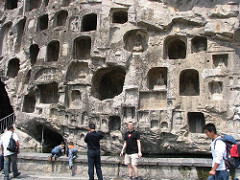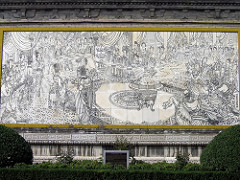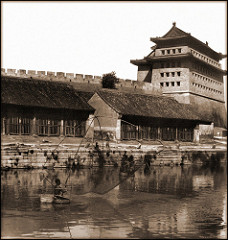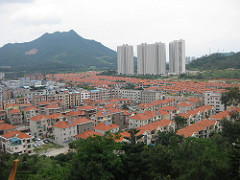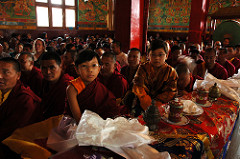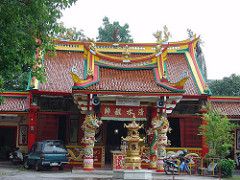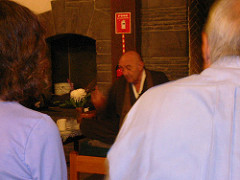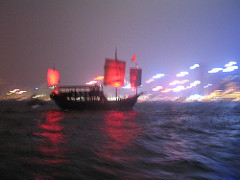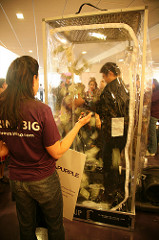Luoyang
During Wu's reign, the court frequently moved East to this location to recruit officials.
Xuanzong
Leading Chinese emperor of the Tang dynasty who reigned from 713 to 755, though he encouraged overexpansion. Defeated Empress Wei.
Kublai Khan
Mongolian emperor of China and grandson of Genghis Khan; In 1271, he founded the Yuan Dynasty, and became the first Yuan emperor., He defeated the Song Dynasty in the process
Grand Canal
Built in 7th century during reign of Yangdi during Sui dynasty; designed to link the original centers of Chinese civilization on the north China plain with the Yangtze river basin to the south; nearly 1200 miles long.
Footbinding
Practice in chinese society to mutilate women's feet in order to make them smaller; produced pain and restricted women's movement; made it easier to confine women to the household, Song Dynasty
Chang'an
The capital city of the Tang Dynasty located in the Wei Valleywhere 2 million people lived during the 700s and 800s... it was the center of government, culture and trade.
Mahayana Buddhism
Great Vehicle' branch of Buddhism followed in China, Japan, and Central Asia. The focus is on reverence for Buddha and for bodhisattvas, enlightened persons who have postponed nirvana to help others attain enlightenment. Main start in Tang Dynasty
Yang Jian
Northern ruler who finally ended the Period of Disunion., Founder of Sui Dynasty, considered the "cultured emperor" In Public work: repair Great Wall, constructed Grand Canal, rebuilt former capital Changan, used FORCED laborers; Emperor Wen. Was murdered by his son (the Yangdi Emperor)
Sui Dynasty
The short dynasty between the Han and the Tang; built the Grand Canal, strengthened the government, and introduced Buddhism to China
Wendi
Member of prominent northern Chinese family during period of Six Dynasties; proclaimed himself emperor; supported by nomadic peoples of northern China; established Sui dynasty. ALSO known as Tang Jian, Was murdered by his son (the Yangdi Emperor)
Yangdi
Second member of Sui dynasty; murdered his father to gain throne; restored Confucian examination system;Extravagance and luxurious he also built a new palace at Luoyang, forced peasants to build a game park responsible for construction of Chinese canal system; Led his subjects into a series of unsuccesful wars against Korea and he was assassinated in 618.
Li Yuan
Was the Duke of Tang, he founded the Tang dynasty; minister for Yangdi; took over empire following assassination of Yangdi; first emperor of Tang dynasty; took imperial title of Gaozu
Tang Tiazong
First great Tang emperor, and 2nd son of Li Yuan its founder., Was able to conquer into Afghanistan.
Gaozong
Third emperor of the Tang Dynasty. He had a stroke and became a vegetable, rendering him unable to technically rule China for several decades. Ws the Husband of Empress Wu. Under his rule, Korea was over run by Chinese Armies ans Silla was created
Silla
Independent Korean kingdom in southeastern part of peninsula; defeated Koguryo along with their Chinese Tang allies; submitted as a vassal of the Tang emperor and agreed to tribute payment; ruled united Korea by 668.
Bureau of Censors
A powerful Bureau in Tang era China that tracked all the officials and their records, also conducted the Chinese Census.
Ministry of Rites
Administered examinations to students from Chinese government schools or those recommended by distinguished scholars in the Tang Dynasty.
Jinshi
Title granted to students who passed the most difficult Chinese examination on all of Chinese literature; became immediate dignitaries and eligible for high office
Pure Land
The place where Amida Buddha has vowed to have reborn those who call on his name ten times at death
Chan Buddhism
Known as Zen in Japan; stressed meditation and appreciation of natural and artistic beauty; popular with members of elite Chinese society
Zen Buddhism
Known as Chan Buddhism in China; stressed meditation and the appreciation of natural and artistic beauty. Main start in Tang Dynasty
Empress Wu
Tang ruler 690-705 C.E. in China; supported Buddhism establishment; she tried to elevate Buddhism to state of religion; had multistory statues of Buddha created
Hymn to Wisdom
A treatise that followed Chan Buddhism, where the ultimate goal is to achieve and know the ultimate Wisdom and find release from the cycle of rebirth.
Wuzong
Chinese emperor of Tang dynasty who openly persecuted Buddhism by destroying monasteries in 840s; reduced influence of Chinese Buddhism in favor of Confucian ideology
Empress Wei
Woman who poisoned her husband, son of Empress Wu, to try and get power but failed.
Yang Guifei
Royal concubine of Tang emperor Xuanzong; introduction of relatives into administration led to revolt.Young woman belonging to harem of Tang prince; raised to status of royal concubine during reign of Xuanzong
Zhao Kuangyin
Founder of Song dynasty; originally a general following fall of Tang; took title of Emperor Taizu; failed to overcome northern Liao dynasty that remained independent. Was also a scholary man who collected books while out on campaigns.
Liao Dynasty
Founded in 907 by Nomadic Khitan peoples from Manchuria; mantained independence from Song dynasty in China.
Khitan
Nomadic peoples of Manchuria; militarily superior to Song dynasty China but influenced by Chinese culture; forced humiliating treaties on Song China in 11th century
Song Dynasty
(960 - 1279 AD); this dynasty was started by Taizu(Zhao Kuangyin); by 1000, a million people were living there; started feet binding; had a magnetic compass; had a navy; traded with india and persia (brought pepper and cotton); first to have paper money, explosive gun powder; Also promoted the scholar gentry over the Military and Aristocracy*landscape black and white paintings, Dynasty that replaced the Tang
Zhu Xi
Most prominent neo-Confucian scholar during the Song dynasty; stressed importance of applying philosophical principles to everyday life.
Neo- Confucians
Revived ancient Confucian teachings in Song era of China; great impact on the dynasties that followed; their emphasis on tradition and hostility to foreign systems made Chinese rulers and bureaucrats less receptive to outside ideas and influences.
Tangut Tribes
Rulers of the Xi Xia kingdom of northwest China(Tibet; one of the regional kingdoms during period of Southern Song; conquered by Mongols in 1226, collected tribute that drained Song resources and burdened Chinese peasantry
Xi Xia
Kingdom of the Tangut people, north of Song Kingdom, in the mid-11th century; collected tribute that drained Song resources and burdened chinese peasantry.
Wang Anshi
Confucian scholar and chief minister of the Song emperor Shenzong in 1070s; introduced sweeping reforms based on Legalists; advocated greater state intervention in society.
Shenzong
Emperor who gave power to Wang Anshi to make mainly legalistic changes during the Song Dynasty
Jurchens
Founders of Qin kingdom(Jin) that succeeded the Liao in northern China; annexed most of the Yellow River basin and forced the Song to flee south.
Jin
Kingdom north of the Song Empire; established by the Jurchens in 115 after overthrowing the Liao dynasty; ended in 1234.
Southern Song
Rump state of the Song Dynasty from 1127 to 1279; carved out of the much larger domains of the Tang and northern Song; Culturally, one of the most glorious reigns in Chinese history.
Junks
Chinese ships equipped with watertight bulkheads, sternpost rudders, compasses, and bamboo fenders; dominant force in Asian seas east of the Malayan peninsula, especially in the Song and Tang Dynasty's were the BEST ships in the world.
Flying Money
Chinese credit instrument that provided credit vouchers to merchants to be redeemed at the end of the voyage; reduced danger of robbery; early form of currency, (fei-chien) because it could blow out of your hand. Started in Tang Dynasty
Abacus
An ancient Chinese counting device that used rods on which were mounted movable counters, a tablet placed horizontally on top of the capital of a column as an aid in supporting the architrave, Was introduced in the Song Dynasty
Li Bo
Most famous poet of the Tang era; blended images of the mundane world with philosophical musings
